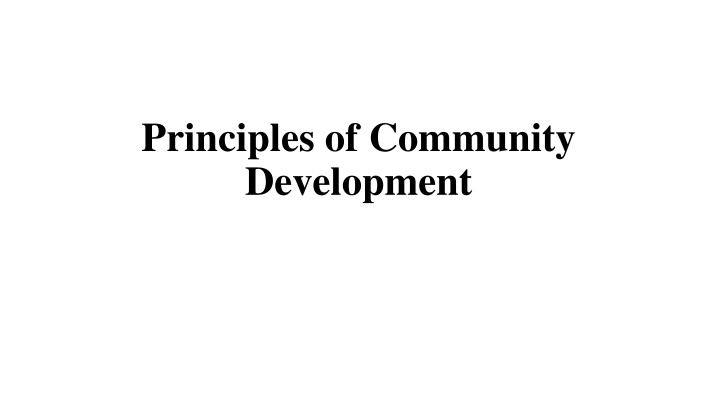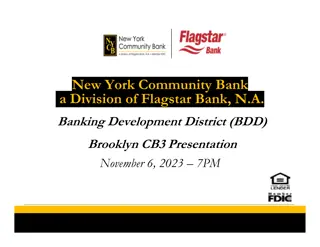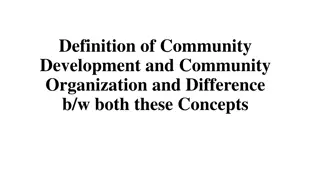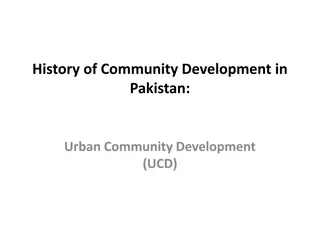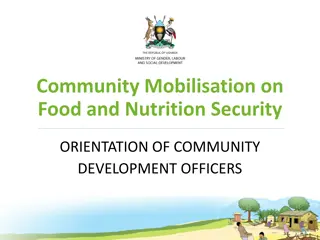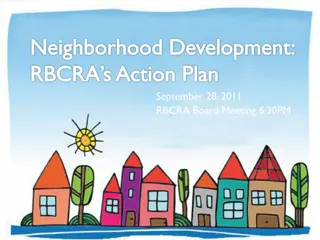Key Principles of Community Development
The principles of community development emphasize the recognition of community members' dignity, active participation, self-help, self-determination, and addressing felt needs. These principles stress the importance of respecting the community's resources, involving community members in decision-making, and tailoring programs to meet the community's expressed needs for sustainable development.
Download Presentation

Please find below an Image/Link to download the presentation.
The content on the website is provided AS IS for your information and personal use only. It may not be sold, licensed, or shared on other websites without obtaining consent from the author.If you encounter any issues during the download, it is possible that the publisher has removed the file from their server.
You are allowed to download the files provided on this website for personal or commercial use, subject to the condition that they are used lawfully. All files are the property of their respective owners.
The content on the website is provided AS IS for your information and personal use only. It may not be sold, licensed, or shared on other websites without obtaining consent from the author.
E N D
Presentation Transcript
Principles of Community Development
1) Principle ofAcceptance or Recognition of the Dignity of Community People: The value of community development is deep-rooted in the recognition of the dignity of each individual of the community. It means the community worker must accept the community as it is and should get him/herself accepted by the community too. This can be done by entering the community without any preconceived notion and by meeting various socio-cultural groups and sub-groups of the community through their leaders. Moreover, he/she should have firm belief in the initiatives and potentialities of the community people to raise the standard of their life through their own efforts.
2) Principle of Participation of Community People: No doubt a community worker has much knowledge, professional skills and a lot of experience, but he is not much familiar with the changing problem as an individual of the community. While the community people know hundred times better about such existing problem than any outsider. That is why, this principle puts much stress on the active participation of community people in the programme designed to promote their well-being.
3) Principle of Self-help: Community development rests on the principle of self-help. The underlying assumption is that every community has latent resources and potentialities which can be activated and mobilized for its self- improvement. It believes that if community people began to help themselves they can face any challenge of life at any moment without relying on external aid.
4) Principle of Self-Determination: Community development believes in the right of self- determination. It believes that people of the community have the complete right to determine their own course of action. So the community worker should provide full freedom to the community in respect of determination of their needs and problems and resources as also the plans and should not impose his/her own views on them. Because the community people know their needs and resources better than any outsider.
5) Principle of Felt Needs: Community development believes in the principle that the program should grow out of the felt and expressed needs of the community people. Because a community is much more likely to undertake and carry on a program which is designed to meet its felt and expressed needs. While the program which is not according to their needs, has very little chances of being undertaken by them. It is not only democratically desirable but also psychologically sound that people are likely to participate in a program connected with their life. Therefore, every program of community welfare should be according to the needs and desires of the community people.
6) Principle of Equal Opportunities forAll: Community development believes in the democratic principle of providing equal opportunities for all sections of people, irrespective of any difference of caste, creed, colour, age and sex. Because if one section of population of the community is ignored and left behind balanced development of the community can not be ensured.
7) Principle of Participation of Local Leadership: A professional community worker should keep in his/her mind that he/she is an outsider or stranger in the community. So without the participation of local leadership i.e. key persons of the community, he/she will not be able to find out different types of needs and problems and sources and resources of that community. Therefore, first of all, he/she will have to conduct a meeting with the local leadership of the community and convince them of his/her purpose. Only in this way he/she will be able to conduct survey of the community which forms the basis of planning and then execution of his/her plan.
8) Principle of Consistency with Cultural Values: Community development stresses that the program should be made in consistence with the existing cultural values of the community concerned. Because the community people consider them their glory and give them great importance. These values have much to do in acceptance or rejection of the program by the community people. So every program started by the community worker should be in accordance with these cultural values, otherwise, it is likely to be rejected by the people of the community where it is to be executed.
9) Principle of Integration of Public and Private Efforts: Community development aims at facilitating better coordination between public and private efforts. So that there should be no over lapping or clash of services with others already existing in the same community or area. 10) Principle of Utilization of Community Resources: Community development puts much emphasis on the utilization of available resources of the community. Because its ultimate objective is to promote well-being of the community through proper utilization of all its available resources.
